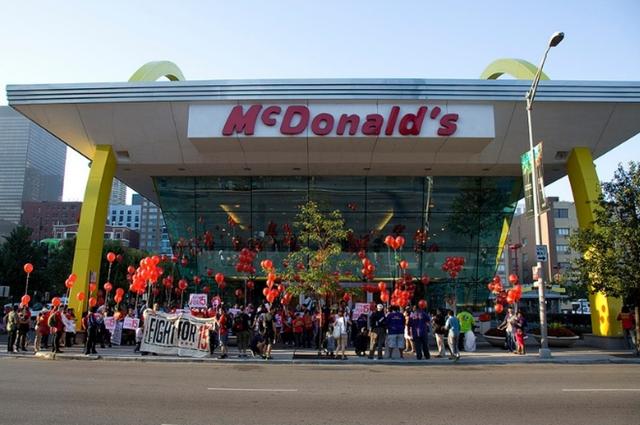The Pros And Cons Of Raising Chicago's Minimum Wage
By Staff in News on Jun 8, 2014 4:00PM

Protestors are seen in August outside the Rock N' Roll McDonald's in August striking for a $15/hour minimum wage. (Photo credit: Justin Carlson)
In late May, Mayor Rahm Emanuel announced the formation of a Minimum Wage Working Group comprised of 18 city legislators and labor representatives.
The task force’s primary goal is to create a plan within the next 45 days to implement both short‐ and long‐term pay increases for minimum wage workers and those employees whose salaries rely primarily on tips.
In announcing the task force, Mayor Emanuel boldly stated “Chicagoans deserve a raise” and that “This diverse group of labor, business and civic leaders will run an inclusive process to determine the right increase to the minimum wage that ensures every working Chicagoan earns a living that gives them a shot at the middle class.”
The group has scheduled the first of a series of public hearings for Monday, June 9, from 7 p.m. to 9 p.m. at Kennedy‐King College, with future hearings to be announced in the next week.
Furthermore, within a week of the Mayor’s announcement, a group of 21 Aldermen introduced an ordinance to gradually raise the city’s minimum wage to an eventual threshold of $15/hour, which would later be pegged to inflation for potential future increases.
The Windy City isn’t alone in its recent flurry of activity around the minimum wage. On June 3, Seattle’s city council unanimously approved a minimum wage increase to $15 per hour to be phased in over a span of several years.
So this begs the question that is shrouded in political optics and is often the cause of heated debate - is an increase in the minimum wage beneficial to society?
In presenting the theories for and against the minimum wage hike, we’re going to keep the points at a high level, as more in‐depth analysis is best left to PhDs and not weekend writers of your favorite local rag. Now let’s also make it abundantly clear that we’re not trying to push an agenda here for either side of the debate.
Instead, we’re simply playing armchair economists. It is up to the citizens of Chicago to come to their own informed conclusions and to communicate their opinions with the Minimum Wage Working Group.
With all of the disclaimers out of the way, let’s dive in!
Pro‐Minimum Wage Increase
Those that believe the minimum wage should be increased feel the current wage does not provide laborers with a living wage, especially in larger cities with soaring costs of living like Chicago, New York City, San Francisco, and Seattle.
Many of these individuals are thus forced to rely on government subsidies to make ends meet, which are funded by all taxpayers. By increasing the minimum wage, the belief is that the need for subsidies will decline and that the private sector will take on further responsibility of providing labor with a living wage.
Advocates of a minimum wage hike also assert that the beneficiaries will have more cash to spend on the bare necessities, such as food, shelter, clothing, childcare, etc. Thusly, though businesses that utilize minimum wage employees (like the big box stores and restaurants) would be forced to pay more for labor - that money would theoretically go back into their own pockets through an increase in sales to the same folks.
Another potential benefit to society in the increase of the minimum wage may be a boost in morale of laborers, under the assertion that a happy worker is a more efficient worker - thereby leading to less turnover amongst staff and a business’ improvement in overall operations.
Anti‐Minimum Wage Increase
So where is the downside in a minimum wage?
Well, we can start with potential price hikes for all customers. When businesses start to feel the pinch of an increase in payroll, the first and easiest solution to maintain their margins could be to escalate prices for goods and services - which could put the minimum wage folks right back in the hole from which they thought they had just climbed out.
Additionally, economic theory suggests that when you put a price floor above the equilibrium wage (the wage at which the supply for workers and demand for workers is equal), this could result in increased unemployment.
If one believes that the $15 threshold is above the theoretical equilibrium wage, then that would mean more people would be willing to work at the higher wage rate at the same time as companies are looking to downsize in order to preserve their margins - leading to an increase in unemployment.
This last theory may be a bit more sensitive and is often considered a political football. There is a belief that minimum wage jobs are not destined to be a permanent stop or end goal on the career path in life for individuals. Instead, such jobs are inherently meant to be a stopgap measure during hard times or for young people just starting their careers.
The lower minimum wage incentivizes laborers to develop additional skills or obtain more education to move on to better paying endeavors. There is a potential fear that by increasing the minimum wage, society would remove the benefit for laborers to improve themselves and pursue the American dream.
So, where do you stand? Let your representatives know on June 9 or in the subsequent meetings, which will be announced on the task force’s web site, which also allows for public comment submissions.
Kennedy‐King College is located at 6301 S. Halsted St.
By: Amol Gavankar